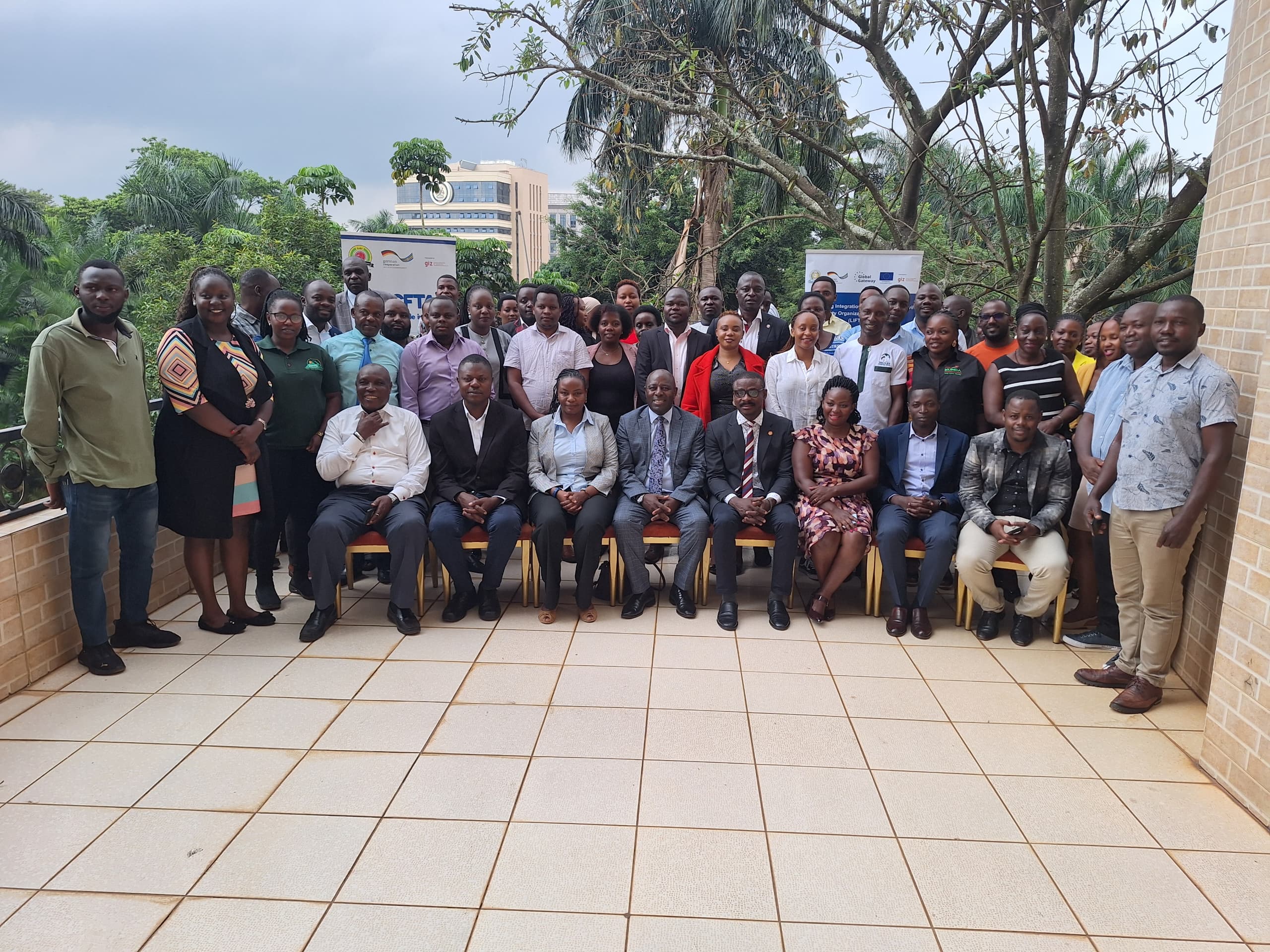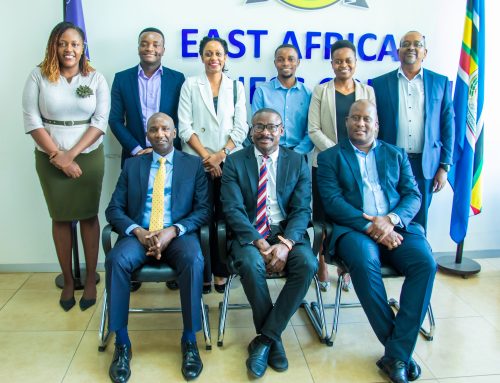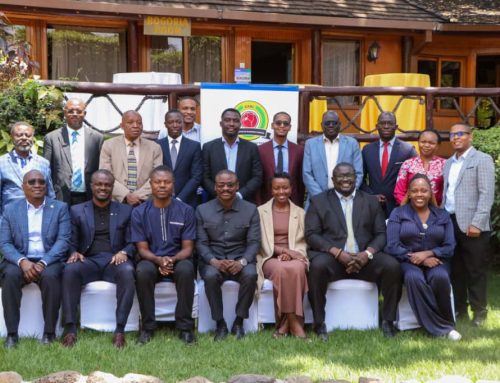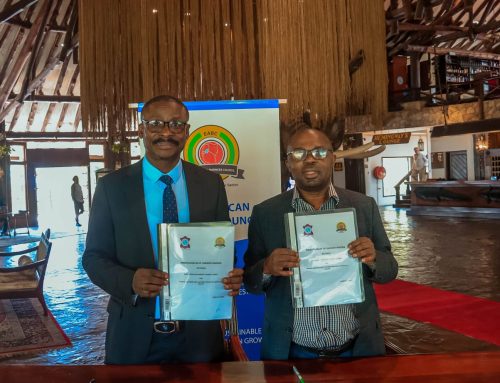Wednesday, 20th November 2024: Kampala, Uganda – Officiating the EABC-GIZ sensitization workshop on the AfCFTA Trade in Services Protocol focusing on the transport and tourism sectors, held on 18th & 19th November in Kampala, Mr. Stuart Mwesigwa, EABC Board Member, urged African countries to prioritize championing regional integration by opening borders for trade, and allowing the free movement of capital, services, and people.
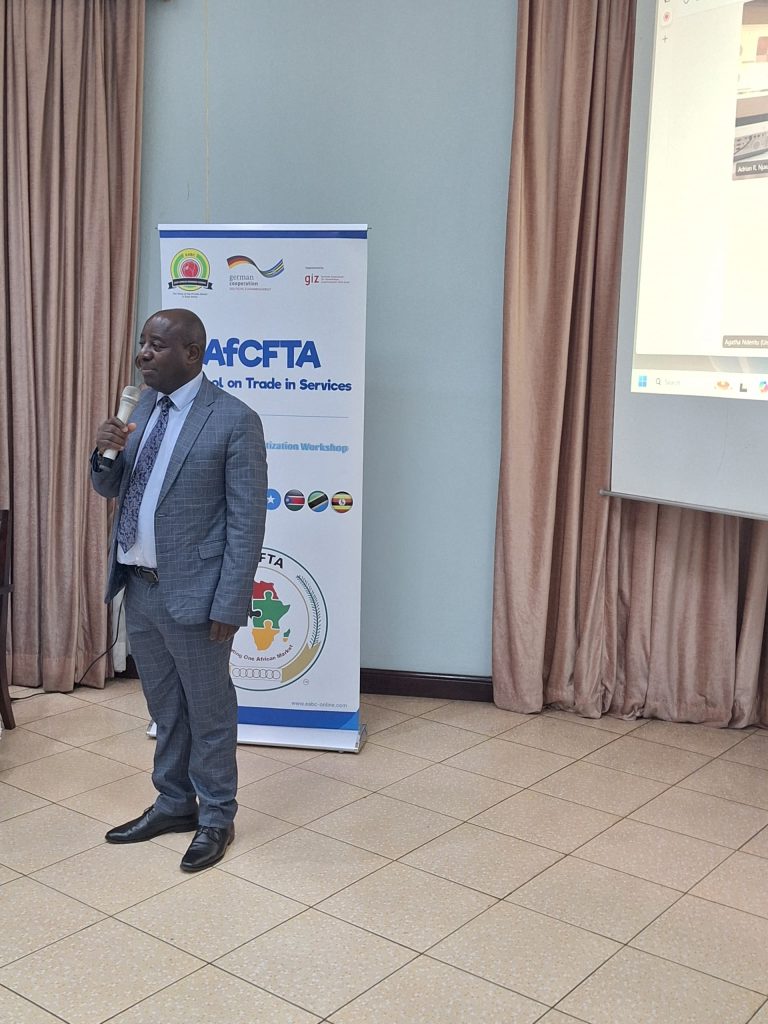
He challenged African businesses to tap into the vast opportunities presented by the AfCFTA. He noted that the liberalization of services under the AfCFTA is poised to attract more African investors to the five priority sectors, introducing competition to improve efficiency and welfare for consumers by providing wider choices while creating jobs for youth.
Ms. Estella Aryada, Component Lead for Trade in Services under the Support to the EAC Integration Process (SEAMPEC II), stated, “In the EAC, tourism contributes, on average, 17% of export earnings, 10% of GDP, and 7% of employment.” She emphasized that upon full implementation, services will be supplied through four modes: cross-border supply, consumption abroad, commercial presence, and movement of natural persons.
 She reiterated GIZ’s commitment to partnering with the private sector in championing a single, liberalized African trade-in-services market and unlocking opportunities within it.
She reiterated GIZ’s commitment to partnering with the private sector in championing a single, liberalized African trade-in-services market and unlocking opportunities within it.
Mr. Collins Agaba, Sector PSF Coordinator for Trade, Transport & Logistics, highlighted that for Uganda, being a land-linked country, the development and liberalization of the transport sector is crucial, as transport significantly impacts the cost of doing business. He elaborated that the removal of restrictions in the transport sector would attract investments, boost competitiveness, and enhance efficiency.
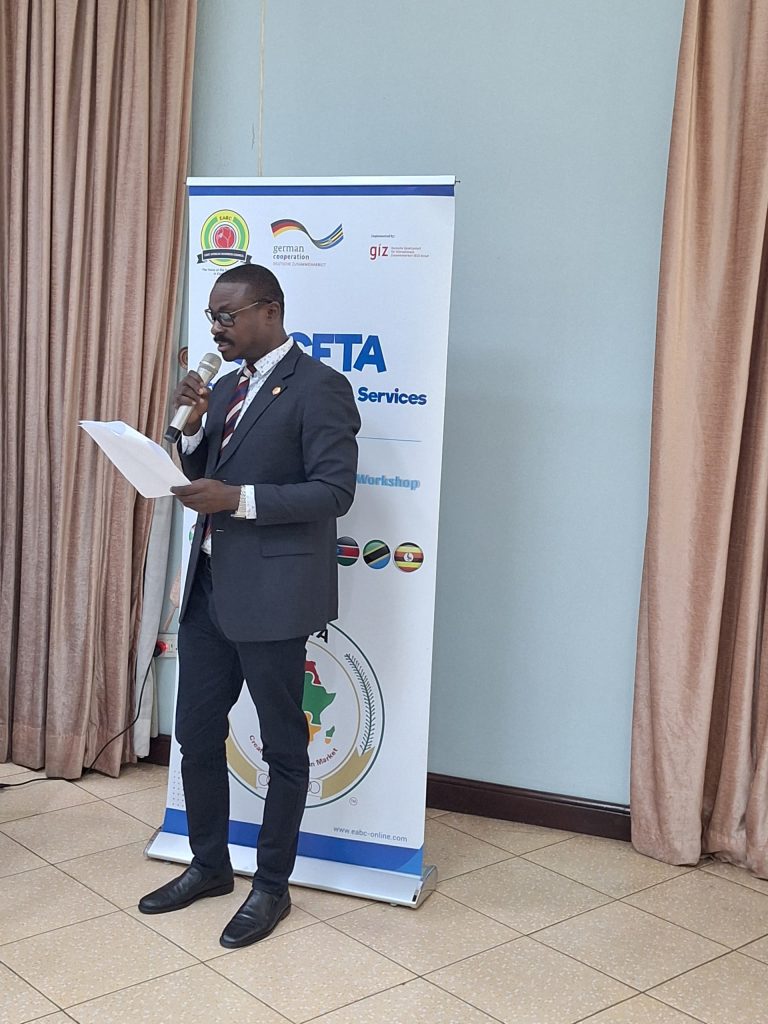 In his remarks, Mr. Adrian Njau, EABC Executive Director, shared that the EAC region exported travel services worth USD 6.3 billion in 2023, compared to imports of USD 1.2 billion. In the same year, the region imported transport services worth USD 5.6 billion, while exporting USD 4.6 billion. He noted that Kenya and Tanzania, as net exporters of transport services due to their port advantages, stand in contrast to other EAC Partner States, which are net importers because of their land-linked nature (2nd Edition of EABC-GIZ Barometer on Trade in Services in EAC, 2024).
In his remarks, Mr. Adrian Njau, EABC Executive Director, shared that the EAC region exported travel services worth USD 6.3 billion in 2023, compared to imports of USD 1.2 billion. In the same year, the region imported transport services worth USD 5.6 billion, while exporting USD 4.6 billion. He noted that Kenya and Tanzania, as net exporters of transport services due to their port advantages, stand in contrast to other EAC Partner States, which are net importers because of their land-linked nature (2nd Edition of EABC-GIZ Barometer on Trade in Services in EAC, 2024).
Under the AfCFTA, the five EAC Partner States jointly submitted a Schedule of Specific Commitments in five priority sectors: business services, communication services, financial services, tourism and travel-related services, and transport services.
While frameworks for services liberalization are essential, they alone cannot ensure the benefits of a liberalized AfCFTA services market. Most firms especially SMEs often lack information about the agreement and its opportunities. Targeted capacity building and export development are needed to provide firms with the knowledge and tools to access new markets under the AfCFTA.
The workshop equipped over 55 transport and tourism business leaders with knowledge of the AfCFTA Protocol on Trade in Services, its provisions, and the commitments made by the EAC and other AfCFTA State Parties.
Participants discussed the commercial benefits arising from the AfCFTA commitments, as well as the challenges in seizing the services market opportunities.
The EAC region is a net exporter of services, having exported services worth USD 14 billion against imports of USD 9.8 billion in 2018. The implementation of AfCFTA commitments on trade in services, complemented by necessary reforms, is expected to boost intra-African trade. Services exports are projected to increase by about 50%, with even greater gains as African countries integrate into regional and global value chains. This growth is expected to deepen intra-African trade, foster economic growth, drive industrialization, and diversify economies across the continent, leading to job creation, skills development, and competitive growth of African services in the global market.
Under the AfCFTA framework, 47 African countries have submitted their initial services offers, with technical verification ongoing to ensure alignment with adopted modalities and guidelines for negotiating trade in services. Regulatory audits are also being conducted for some Member States. To date, 22 Schedules of Specific Commitments have been approved by the Council of Ministers, with several others in the pipeline. Five sub-committees of the Committee on Trade in Services were established in May 2021 to further guide negotiations. Discussions on regulatory frameworks for financial and communication services are underway, with draft texts available. However, negotiations are yet to commence for the remaining seven service sectors, and work on additional regulatory frameworks has begun.
To accelerate meaningful trade under the AfCFTA, the Guided Trade Initiative on Trade in Services (GTIS) was developed following recommendations from the 10th Council of Ministers meeting. The initiative serves as an interim solution for interested state parties meeting the minimum requirements, allowing them to test the readiness of their private sectors and the operational, legal, and trade policy environment under the AfCFTA. Currently, the 22 approved schedules include participation from regions such as the CEMAC (e.g., Gabon, Cameroon, and Chad), the EAC (including the DRC but excluding South Sudan and Somalia), and other countries like Egypt, Zambia, and Mauritius.
UNECA’s 2021 ARIA X report highlighted that regional tourism in Africa has remained at 48% since 2013, compared to a global average of 80%. In 2018, for example, France hosted 86 million visitors, with 79% coming from within Europe. Southern Africa comes closest to the global standard, with 77% of tourist arrivals originating within the region, compared to 47% in Central Africa and just 42% in East Africa. This reveals a significant opportunity to harness the continental market as a source of tourists while emphasizing the need for air transport liberalization to enhance regional connectivity.
The transport sector is poised to play a critical role in realizing AfCFTA gains. Intra-African trade in transport services could increase by nearly 50%, with over 25% of trade gains in services and nearly 40% of the increase in Africa’s services production expected to come from transport. However, Africa faces challenges, including high freight costs, with maritime rates in sub-Saharan Africa three times higher than in other developing regions. Transport accounts for up to a third of the final price of goods in Africa, compared to less than 10% in other regions.
Implementing AfCFTA commitments alongside key regional infrastructure projects is essential to overcoming these challenges. Projects under the African Union’s Agenda 2063, such as the Program for Infrastructure Development in Africa (PIDA), aim to integrate transport, energy, ICT, and transboundary water networks to boost trade and job creation. The Integrated High-Speed Train Network seeks to connect African capitals and commercial centers, while the Single African Air Transport Market (SAATM) aims to unify air transport markets, enhancing connectivity. These initiatives, combined with AfCFTA, could require investments of approximately USD 411 billion to meet infrastructure and equipment needs, including over two million trucks, 169,339 rail wagons, 135 vessels, and 243 aircraft.

